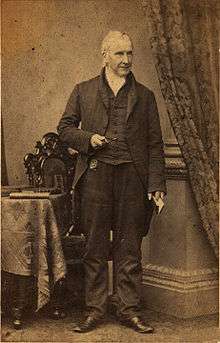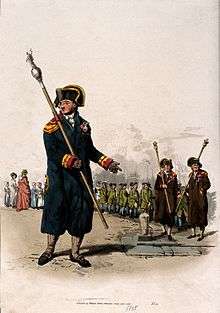William Miller (British publisher)

William Richard Beckford Miller (25 March 1769 – 25 October 1844) was one of the leading English publishers of the early 19th century.
Origins and early life
William Miller was born at Bungay, Suffolk, on 25 March 1769, the son of Thomas Miller (1731–1804), a bookseller and antiquarian, and Sally Kingsbury of Waveney House, Bungay. As a youth, he evinced a taste for drawing, and was advised by Sir Joshua Reynolds to enter the Royal Academy as a student, but in 1787 he was placed in Hookham's publishing house.
Career as a publisher

In 1790 he commenced business on his own account in Bond Street, London, where the first book which he sent forth was his uncle Dr. Edward Miller's Select Portions of the New Version of the Psalms of David, with Music. A series of publications in large quarto, illustrating the costumes of various countries, with descriptions in English and French, brought him considerable profit. Among his other successful ventures may be mentioned Hewlett's Views of Lincolnshire, John Stoddart's Remarks upon Scotland and Forster's edition of the Arabian Nights Entertainments, illustrated by Robert Smirke. In 1804 Miller removed to a larger house in Albemarle Street, where he continued until his retirement from business in 1812, being succeeded by John Murray. During this period he was one of the most popular publishers in London. He took shares in the poems of Sir Walter Scott, and published solely Scott's edition of Dryden in 18 volumes octavo. He reprinted The Antient Drama, British Drama, Shakespeare and Francis Blomefield's History of Norfolk, 11 volumes, octavo, and Samuel Richardson's works in nineteen small octavo volumes. The Travels of Viscount Valentia, Sir Richard Colt Hoare's Giraldus Cambrensis and the same author's Ancient History of South Wiltshire, volume i., were among his most splendid undertakings. His British Gallery was notable for the excellence of the engravings. In 1826 he published two quarto volumes of Biographical Sketches of British Characters recently deceased, commencing with the Accession of George the Fourth, with a list of their Engraved Portraits. He announced, but did not print, a continuation.
A less successful venture
For the copyright of Charles James Fox's History of the Reign of James II Miller paid £4,500, hitherto the largest sum ever given for literary property. Five thousand copies were printed in demy quarto at £1.16s. by Savage, and 250 copies on royal quarto at £2.12s.6d., with fifty upon elephant size quarto at £5 by Bulmer. Miller barely cleared his expenses by the speculation.
An unfortunate decision
In 1810, Miller turned down the chance to publish Lord Byron's epic poem "Childe Harold". This decision was supposedly taken because the poem attacked Miller's patron, Lord Elgin, as a "plunderer" (an opinion not a few Greeks would agree with). As a business decision it was unfortunate as John Murray II published it instead with great success. A forgiving Lord Byron wrote to William Miller saying that he could "perfectly conceive, and indeed approve your reasons, and assure you my sensations are not Archiepiscopal enough as yet to regret the rejection of my Homilies."
Retirement and death
In Beloe's Sexagenarian (vol. ii pp. 270,271), William Miller is described as "the splendid bookseller", who "was enabled to retire to tranquillity and independence long before the decline of life, or infirmities of age, rendering it necessary to do so". However, in a private memoir written in 1841, Miller, writing in the third person, states" various circumstances connected with his extensive concerns, but which it is unnecessary to swell this memoir by detailing, induced him after long & mature deliberation to retire from business in 1812 when he was succeeded by the present Mr. John Murray." Rather than having attained riches as his peers had been led to believe, Miller states that his " retirement from business was a bold & irretrievable act at the age of forty-two when he was thrown upon his own resources with a very scanty realized property and a young family to bring up, educate & send into the world." Miller took a farm in Hertfordshire, but after a brief experience of country life and five years on the continent, he removed to Duchess Street, Portland Place, London. He died on 25 October 1844, at Dennington, Suffolk, the residence of his son, the Rev. Stanley Miller.
Private life
In 1790, at Doncaster, Miller married his cousin Mary, second daughter of his uncle Dr. Edward Miller organist of Doncaster and composer (When I survey the Wondrous Cross). Mary died the following year and in 1798, Miller married Susannah, the daughter of the Reverend Richard Chapman of Bakewell in Derbyshire, by whom he had four children - two sons and two daughters. One of his descendants is the British Nobel Prize-winning Chemist, Dorothy Crowfoot Hodgkin (1910–1994).[1] There is a good portrait of him, engraved by E. Scriven, after a painting by Thomas Phillips R. A.
References
- ↑ Burke's Family Records (Harrison & Sons, London, 1897), at pages 194-195
- Attribution
![]() This article incorporates text from a publication now in the public domain: "Miller, William (1769-1844)". Dictionary of National Biography. London: Smith, Elder & Co. 1885–1900.
This article incorporates text from a publication now in the public domain: "Miller, William (1769-1844)". Dictionary of National Biography. London: Smith, Elder & Co. 1885–1900.
External links
![]() Media related to William Miller (1769-1844) at Wikimedia Commons
Media related to William Miller (1769-1844) at Wikimedia Commons